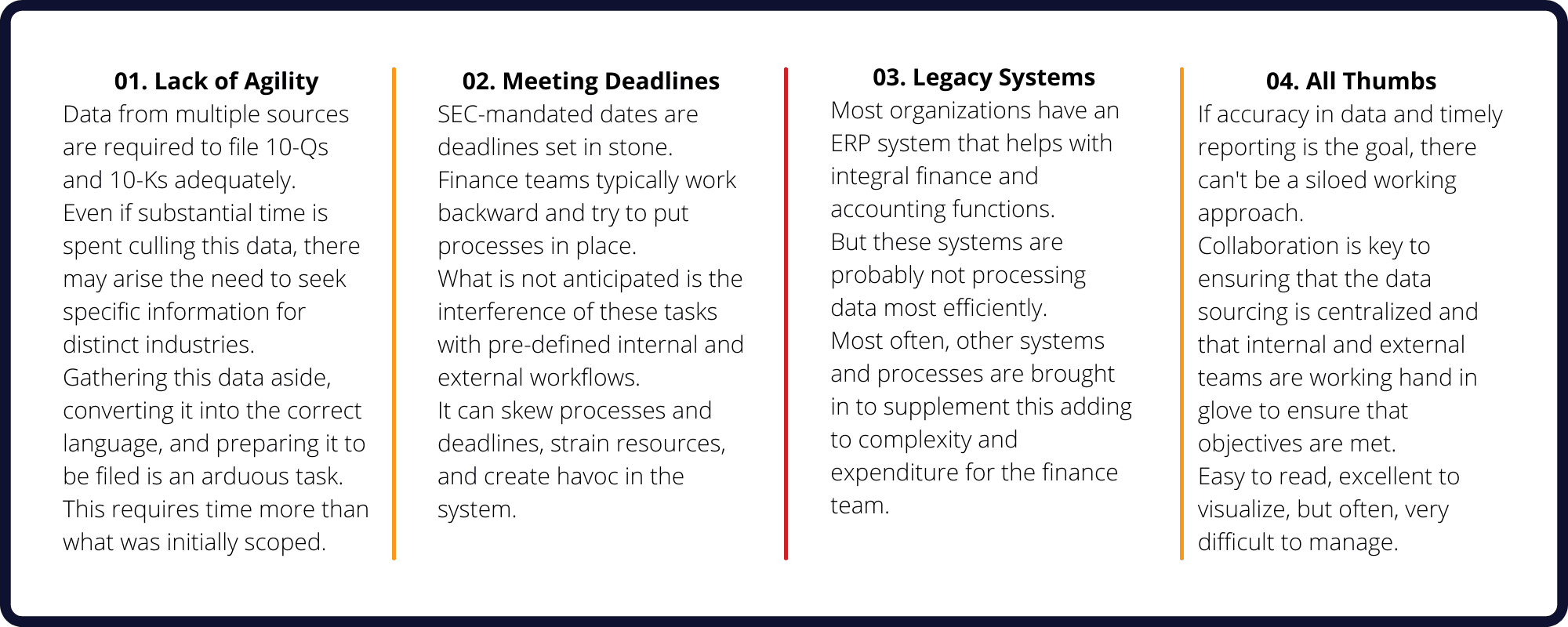4 challenges faced while filing compliance reports with SEC
SEC reporting and filing is a square maze. It’s all structured, but there is only a distinct path that can take you to safety. Hence, it is not surprising to know that your organization’s finance team is probably on its toes every quarter.
Reporting mandates and disclosure terms leave no room for sidestepping or error. It can add to the pressure for publicly traded companies’ executives to draw up an accurate report for submission to the regulatory authority.
An efficient solution to ease the burden? Partner with a Fully Managed Services provider for SEC compliance. Lending a hand in streamlining the reporting and compliance process with alleviating error and pressure, the advent of this advancement can revolutionize the reporting landscape. Read on to learn more about the most common reporting challenges and how a seasoned end-to-end service provider can be a viable solution.
Quarterly and annual SEC filings do take up a significant chunk of process orientation. Most organizations do not pay keen attention to the time and resources that these needs, and almost all the time, face these challenges:

Other Common SEC Reporting Compliance Challenges
Regulatory Tightrope
- Balancing Compliance: Public companies must adhere to changing SEC regulations and accounting standards (GAAP) to ensure accurate financial reporting. This involves regularly updating internal processes to stay compliant and avoid penalties.
- Staying Current: It’s crucial to keep up with regulatory changes and integrate them promptly into the company’s internal control systems to prevent non-compliance.
Data Aggregation Challenge
- Standardized Data Collection: Collecting consistent and accurate financial data from various internal systems can be challenging and time-consuming.
- Disclosure Gap Identification: Identifying and correcting differences between past footnote disclosures and current SEC requirements is essential for clear and accurate financial communication.
Accuracy & Integrity Imperative
- Data Quality Assurance: Ensuring the accuracy and integrity of financial statements requires robust internal controls and thorough data quality checks.
- Material Weakness Identification: It’s important to address any identified weaknesses in internal controls to mitigate risks and maintain reliable financial reporting.
Compliance Crossroads
- Managing Legal & Regulatory Risks: Non-compliance with SEC regulations can result in significant legal and financial penalties, making proactive risk management and compliance procedures essential.
- Cybersecurity Imperative: Protecting sensitive financial data from cyber threats requires robust data security and cybersecurity measures.
Auditor Collaboration
- Effective Communication: Open communication with external auditors helps resolve discrepancies and concerns promptly, ensuring a smooth review process.
- Managing Expectations: Understanding and meeting auditor expectations regarding disclosures and documentation is key to a successful audit engagement.
- So, what do you do to overcome these? A new data management system or perhaps amp up resourcing. But there is a far more sustainable solution. Automation and technological advancement have paved the way for cloud-based solutions that can utilize resources efficiently, enhance collaboration and lead to timely completion of tasks.
– Most service providers offer software that can automate administrative burden. Report-wide data tagging, auto-update of tagging when rolled forward, and even role hierarchies and section assigns can help stick to deadlines and accurate work.
– Most cloud-based software solutions can be integrated with existing systems to bridge shortcomings in ERP or Excel.
– Software can assist with direct submission to the regulator, saving you the worry of completing the task successfully.
– The software providers can offer services that can potentially eliminate the need for a separate team in-house. They can assist with data sourcing, number crunching, and report creation, leaving you free to focus on other critical tasks.
In summary, regulatory reporting always comes with a host of challenges in tow.
(1) You can invest in a SEC reporting software and prepare compliance reports with your own team or
(2) partner with a Fully Managed Service Provider and relieve the additional responsibility of compliance reporting.
We manage over 800+clients in the US and have delivered over 17,000 XBRL reports and 84,000 EDGAR filings for our clients regulated by SEC.
While this blog has skimmed the surface of how we can help, you can get in touch with an iXBRL expert to know more about how we can simplify compliance reporting for you.
FAQs
What are the primary challenges in meeting SEC reporting deadlines?
The main challenges include ensuring efficient data collection and report generation, maintaining accuracy and integrity of the financial information, and balancing internal reporting cycles with the strict deadlines set by the SEC. Effective internal processes and robust planning are essential to meet these deadlines without compromising the quality of the reports.
How can companies stay current with evolving SEC regulations?
Companies can stay current by continuously monitoring regulatory updates, participating in industry forums, subscribing to regulatory news services, and regularly reviewing and updating their internal control frameworks. Implementing a dedicated compliance team or using specialized compliance software can also help ensure timely and accurate updates.
What steps can be taken to improve data quality and integrity in financial reporting?
Improving data quality and integrity involves implementing strong internal controls, conducting regular data quality checks, and ensuring consistent data collection from various internal systems. Training staff on data management best practices and using automated financial reporting tools can also help maintain high data quality standards.
How important is cybersecurity in the context of SEC reporting?
Cybersecurity is crucial in SEC reporting as financial data is highly sensitive and a prime target for cyber threats. Implementing robust cybersecurity measures protects this information from breaches and ensures compliance with data protection regulations. Companies should regularly update their cybersecurity protocols and conduct periodic security audits to safeguard their financial data.




